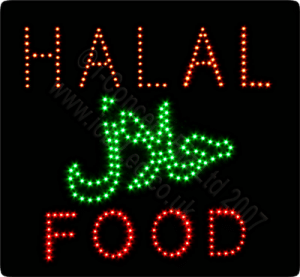by HalalFocus
The recent European Halal conference held on 14th September at the Exhibition Centre was organised by DT Food e.V. and Messe Düsseldorf and gathered around 75 Halal sector stakeholders from around Europe.
This was the first such event to be held in Germany, and it brought a new flavour to the existing ‘buffet’ of Halal conferences and exhibitions on offer around Europe and the UK.
Opening with some excellent Qur’an recitation from Mustafa Kader, and competently MC’d by DT Food’s Holger Hey, the morning session was made up of rapid-fire presentations by various presenters including Farhan Tufail (HCS-Schweiz), Antoine Bonnel (Paris Halal Expo) and Günther Ahmet Rusznak (IIDZ Österreich)
The afternoon sessions were split into three working groups discussing Religious, Marketing and Certification issues.
Among the issues that emerged in the main Certification session was the matter of the impending EU legislation that intends to enforce compulsory labelling on meat from non-stunned slaughter.
This contentious issue appears to be a clear step towards stigmatising religious slaughter by implying that it is an unethical practice. Not only is there no clear scientific evidence to support this position, but religious slaughter has been declared ‘humane’ as a matter of law in the United States and is considered to be compliant with animal welfare norms by leading veterinary scientists such as Dr Temple Grandin and Professor Joe Regenstein.
If this legislation is allowed to be passed into law without opposition, it will require all meat products derived from unstunned animals to be labelled accordingly.
The Muslim communities in Europe have remained largely silent on this issue, probably more from a lack of information rather than a lack of concern. Indeed, the average informed Muslim consumer would prefer meat to come from unstunned animals to be fully confident that the animal in question was alive and undamaged at the time of slaughter.
This would not only have an effect for meat producers within the EU, but would also affect all countries exporting meat-derived products into the EU. With Muslim countries now frowning upon stunning in their Halal Standards (such as Malaysia’s MS1500:2009) or banning it altogether (such as Brunei Darussalam’s PBD 24:2007), the move by the EU seems to be out-of-step with the overall currents within the Muslim world.
The International Halal Integrity Alliance, a non-national, non-profit trade association that is in the middle of the rather complex process of developing Halal standards under the OIC umbrella has also recently come out strongly in favour of non-stunning.
The issue at stake – ultimately – is the right to perform religious sacrifice, an activity that dates back to the time of the Prophet Abraham, peace be upon him. It is a core ‘fitra’ human activity that has been at the basis of the major religions for millennia.
The Düsseldorf conference session, ably moderated by journalist and Muslim convert Peter Zeigler, also noted that Halal has no legal status in Germany, and the Halal consumers were not protected in any way from unscrupulous practices and claims about Halal.
The other main issue that was raised was the need to regulate and standardise the operating procedures of the Halal certification bodies. Farhan Tufail of HCS-Schweiz suggested that rather than chase the illusive global Halal standard, we – both industry and consumers – might all be better served if the certification procedures themselves were standardised.
This would at least go some way to relieving the consumer doubts about what Halal certification really means, even if there are different standards being utilised. The creation of national and/or regional accreditation bodies is an initiative that industry players would welcome, and may help to straighten out the journey through a maze that getting certification often entails.
The conference finished with four resolutions:
1. Write to the German Agriculture Minister to insist that Halal be granted some form of legal recognition and status under German law.
2. Write to Members of the European Parliament to request opposition to the proposal to enforce labelling for products derived from unstunned slaughter.
3. Invite Turkish leader Tayyip Erdogan to support these initiatives from both the German and European perspectives.
4. Engage the support of main Islamic groups and associations to support these initiatives.
So many conferences end with no specific action, so it was encouraging for this conference to conclude with some specific actions.
These key issues will also form part of the themes and issues that will be examined and discussed in greater detail during the two days of the World Halal Forum Europe, scheduled for 10-11 November 2010 in London.
For more details about the WHF, please see www.worldhalalforum.org or contact the UK secretariat on 01953 798482 or email hamid@worldhalalforum.org.



